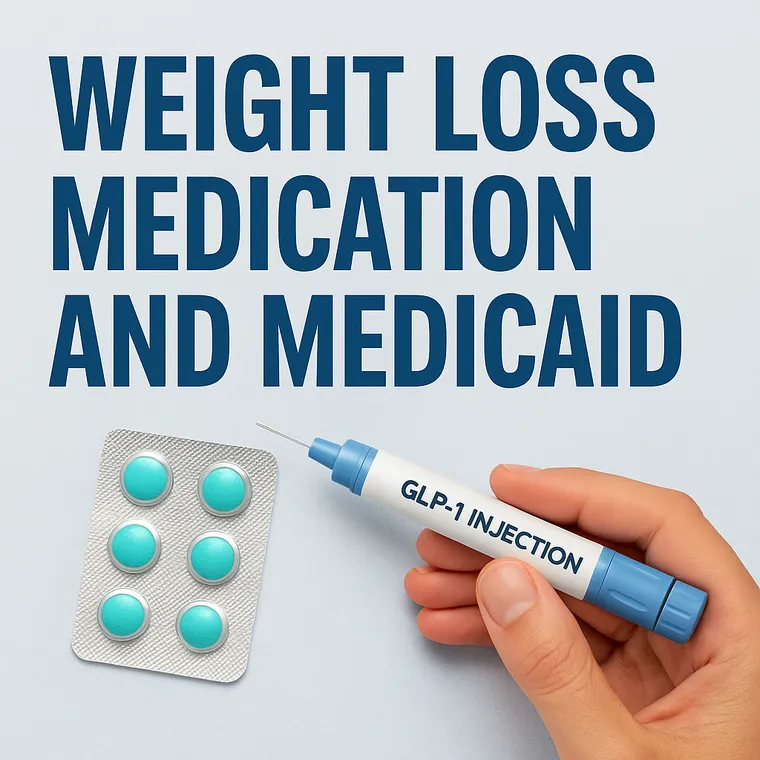But with monthly costs exceeding $1,000 without insurance, the big question for many low-income individuals is: Does Medicaid cover these weight loss options?
The answer is complicated—and it depends on where you live.
What Are GLP-1 Medications?
GLP-1 (glucagon-like peptide-1) receptor agonists like Wegovy (semaglutide), Zepbound (tirzepatide), Saxenda, Ozempic, and Mounjaro are medications originally developed to manage type 2 diabetes. But they also help regulate appetite and insulin levels, which has made them remarkably effective for weight loss.
While Ozempic and Mounjaro are FDA-approved for diabetes, Wegovy, Zepbound, and Saxenda are FDA-approved specifically for chronic weight management in people with obesity or certain weight-related conditions.
Is Weight Loss Medication Covered by Medicaid?
Medicaid coverage for weight loss medication is not standardized. Each state sets its own rules, meaning that coverage varies significantly across the country.
Some states offer full coverage for GLP-1 weight loss drugs like Wegovy, while others restrict access or exclude coverage entirely. As of 2025, at least 9 states provide Medicaid coverage for Wegovy or similar weight loss shots, including:
- California
- Connecticut
- Delaware
- Michigan
- Minnesota
- Pennsylvania
- Rhode Island
- Virginia
- Wisconsin
In these states, Medicaid may cover the cost of GLP-1 medications, but often requires that patients meet strict criteria—such as a minimum BMI or documentation of past unsuccessful weight-loss efforts. Prior authorization is almost always required.
Other states, however, do not cover GLP-1 medications for weight loss, citing high costs or lack of long-term data on outcomes.
Is Wegovy Covered by Medicaid?
Wegovy is the most widely known GLP-1 weight loss shot on the market. Some Medicaid programs do cover Wegovy, but with caveats:
- You may need a BMI of 30 or higher (or 27+ with another condition like hypertension or diabetes)
- You often must show evidence of trying diet and exercise for at least 6 months
- Your doctor must complete a prior authorization form
- Coverage is not guaranteed in every state
States like California (Medi-Cal) currently cover Wegovy, but even that is in flux. In 2025, Governor Gavin Newsom proposed removing Wegovy from the state’s Medi-Cal formulary due to skyrocketing costs—highlighting the financial strain these drugs are putting on public programs.
So while the answer to “Does Medicaid cover Wegovy for weight loss?” is yes in some states, coverage can change fast.
Does Medicaid Cover Ozempic or Mounjaro for Weight Loss?
Here’s where things get tricky. Ozempic and Mounjaro are technically not approved for weight loss, but rather for type 2 diabetes. Medicaid will typically only cover them if you're using them for diabetes management—not simply for weight loss.
This means if you're overweight or obese but not diabetic, your Medicaid plan is unlikely to approve Ozempic or Mounjaro for weight management.
Instead, Medicaid programs that offer weight-loss medication will usually focus on Wegovy, Zepbound, or Saxenda, which are approved for weight loss specifically.
What Weight Loss Injections Does Medicaid Cover?
If you’re wondering what weight loss shot Medicaid covers, the answer will vary by state. The most commonly covered options, when available, are:
- Wegovy – semaglutide, approved for weight loss
- Saxenda – liraglutide, another GLP-1 approved for weight loss
- Zepbound – tirzepatide, newly approved for obesity in late 2023
Some Medicaid plans also support coverage for generic phentermine-topiramate or naltrexone-bupropion, oral weight loss medications. However, their effectiveness tends to be less dramatic than GLP-1 injections.
To find out whether these shots are covered in your state, contact your local Medicaid office or check your state's preferred drug list (PDL) online.
The Cost Burden on Medicaid
The sudden popularity of GLP-1 drugs is creating major budget headaches for state Medicaid programs. Spending on these medications jumped from $577 million in 2019 to nearly $4 billion in 2023, according to federal data.
Some states have started limiting access even further—adding step therapy (requiring older medications first), BMI thresholds, or restricting use to diabetes patients only.
Still, as more studies show that GLP-1 drugs not only promote weight loss but also reduce long-term health costs from heart disease, diabetes, and high blood pressure, some states may expand coverage in the future.
How to Get Weight Loss Medication with Medicaid
If you're interested in starting a GLP-1 medication like Wegovy or Zepbound and you’re on Medicaid, here are the steps to take:
- Check your state’s Medicaid formulary
- Search online for your state's “Medicaid preferred drug list” or call the Medicaid customer service line.
- Schedule an appointment with a primary care provider
- They can assess your BMI, health history, and determine whether you qualify.
- Ask about prior authorization
- Your doctor may need to fill out specific paperwork proving medical necessity.
- Prepare documentation
- You may be asked to show proof of prior weight-loss attempts, like diet logs or program participation.
- Stay in touch
- Medicaid approvals can take time, so follow up and ask your provider for updates.
Final Thoughts
For many people, weight loss through Medicaid is possible—but not easy. While access to powerful medications like Wegovy and Zepbound is improving, state-by-state policies, budget constraints, and medical requirements can make the process confusing and slow.
Still, if you qualify and live in a state that provides coverage, these medications can be a life-changing tool in your journey toward better health.
Sources:

